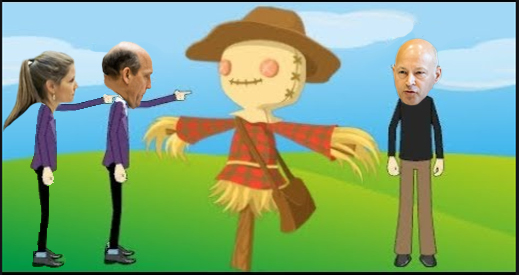

by John Helmer, Moscow
@bears_with
For a brief moment in the presentation this week of the defence case against the Dutch government’s indictment of Oleg Pulatov for murder in the shoot-down of Malaysia Airlines Flight MH17, the Dutch lawyer Boudewijn Van Eijck almost said there was no case to answer, and the indictment should be dismissed immediately for lack of evidence that is legal under Dutch law.
“The indictment is superficial when it comes to actual facts which the defendant is accused of,” Van Eijck (lead image, 2nd from left) said (June 22, Min 21:19). “It is not clear at this stage of this very question whether the actions would actually amount to a crime even if they could be proved.”
Van Eijck also warned the presiding judge Hendrik Steenhuis (right) that he is on trial himself – that he should not continue the trial on the prosecution’s evidence, ignoring the defence requests for fresh investigation and new witnesses, “in order to make sure that this case never has to be reviewed on appeal” (June 22, Min 42:35).
The next day, Sabine ten Doessschate (1st left), the junior defence lawyer, summed up the defence case by undercutting her leader. She apologised to the Dutch press and to families of those killed on MH17 for presenting what she called “conspiracy theories”. “All of the topics which we have talked about,” ten Doesschate concluded on June 23, “for all of these we have asked ourselves, on the basis of what we have read, can we really say this is what really happened; and this is not the other thing which happened. And our answer is no. On the basis of the file we have at this moment it is impossible for us to say either one… this means we don’t have all the answers. Investigation of topics like these can give hard facts which can give the answer to the question, how was MH17 brought down. If we were not to ask in detail for investigation, we would not be able to look at ourselves in the mirror. This is the least that can be expected of us” (June 23, Min 2:53:19).
The Dutch defence lawyers have wound up defending themselves. Judge Steenhuis, who looks in a different mirror, has promised to issue his rulings on July 3.
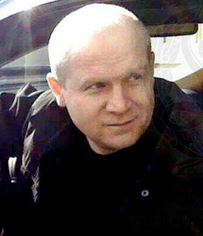
Van Eijck and ten Doesschate have been retained to represent Pulatov (right), a retired Russian Army lieutenant colonel and one of four men charged with murder and with shooting down MH17 on July 17, 2014. The criminal trial experience of the Dutch lawyers to date has been restricted to defending Rotterdam policemen. They have yet to say publicly, inside or outside the courtroom, that their client is innocent of the charges. In Monday’s hearing, van Eijck could not bring himself to speak of him as Mister Pulatov. For their refusal to answer press questions and details of the public relations front the lawyers have been running to date, read this.
On Monday van Eijck opened with a presentation of what in the London courts is called the skeleton of argument. Van Eijck called it a “road map”. “I would like to make it very clear,” he began, “that today we are not pleading regarding the question of guilt. We will only be looking at the question of what investigation we think still needs to be done in this case” (June 22, Min 08:33).
The Dutch Ministry of Justice and Security and the District Court of The Hague, which are conducting the MH17 trial at the Schiphol Judicial Complex, allow a live stream of the proceedings, but provide no transcript or video archive. The Ruptly unit of Russian state television broadcasts the trial hearings live and in an archived link. This is accessible on YouTube, which attaches a warning against the Russian government under the screen.
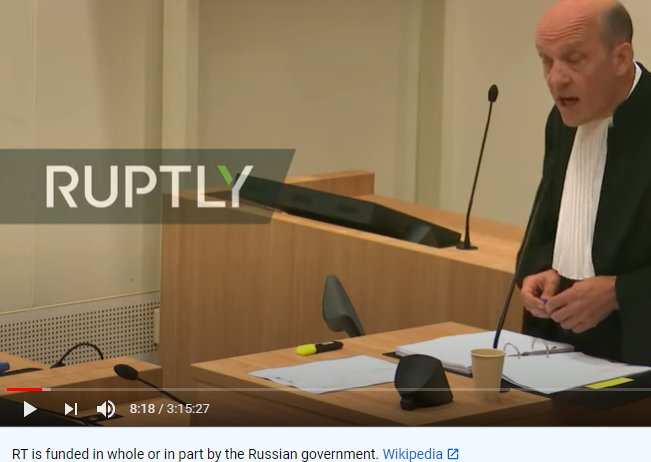
Source: https://www.youtube.com/
To date, YouTube reports there have been less than 3,000 viewers of these daily recordings.
Follow the archived tape of the June 22 proceeding here.
Van Eijck also began defensively towards the mainstream media. We are proceeding, he conceded, “against the tide” (June 22, Min 10:40). He was proposing, he said, “a different look at the case” (June 22, Min 11:15). That led to the conclusion, he said, that the Ukrainian Security Service (SBU) and prosecutors, and higher Ukrainian officials, had applied political pressure on the Dutch government “to go easy on Ukraine [but take a] hard stance on the Russian Federation” (June 22, Min 1:32:00). This Ukrainian policy “does not reflect a willingness and a determination to uncover the truth” (June 22, Min 1:39:00).
This is almost a declaration to the judge that no criminal trial based on such evidence and influence can be lawful. Almost, but not quite. “That is one of the reasons why one needs to consider the resulting investigation with a critical eye when it comes to the position of Ukraine and its involvement therein (June 22, Min 1:39:50). Van Eijk was offering Steenhuis the opportunity to continue his trial.
Taking the main sources of the prosecution’s evidence one by one, the lawyer said there was no forensic reliability or the required chain of custody for evidence taken from the crash site; from the 30% of aircraft wreckage transported to The Netherlands; from soil sampling of suspected missile launch sites; from telephone call interceptions by the SBU; from missing Ukrainian radar tapes; from salvaged missile debris; and from autopsy results reported from at least 27 victim post-mortems conducted by the SBU before the bodies were returned to Amsterdam.
For the first time in court, van Eijck revealed from the prosecution case file that not only had all of the witnesses testifying been “put forward through the SBU” (June 22, Min 1:02:01), but some of the witnesses were in prison, under arrest by the SBU when they gave their testimony. “Witnesses under arrest for another crime are not reliable witnesses”, (June 22, Min 1:03:10) van Eijck told the court. “This should be borne in mind when these statements are later assessed”.
Van Eijck did not argue that the court could not accept such witness evidence as admissible under the Dutch Criminal Code. He did not dismiss the evidence as unlawfully gathered, according to the Dutch Criminal Procedure Code. The lawyer conceded there will be a later – that Steenhuis will proceed to a trial of the charges.
Van Eijck challenged the prosecution for relying on 108 reports by experts of the Netherlands Forensic Institute (NFI) and 130 reports from experts of other Dutch state organisations, the details and authors of which van Eijck said had been withheld from the defence. “The experts essentially dictate the prosecution’s evidence” (June 22, Min 20:07). He did not say the expert evidence cannot be admitted in the trial because it is not direct evidence of Pulatov’s alleged crime.
“Who gave the instruction for a missile to be launched and what purpose it was for,” van Eijk summarized, “is still unknown in the investigation” (June 22, Min 26:37). This is almost to say that the criminal charges against Pulatov have not been substantiated in the prosecution’s case, and that accordingly he has no case to answer. Van Eijck did not tell the court that in Dutch law defendants are not required to prove their innocence.
“If the chain of command and the responsibilities associated with it are completely unknown, then how can we assess that Pulatov had any responsibility. And if he had any responsibility, what responsibility” (June 22, Min 27:46). “All of this leads us to the conclusion that the case against our client is very far from ready for assessment in court” (June 22, Min 32:33).
Van Eijck could have told the judge that this should be his conclusion without delay, and the case against Pulatov dismissed. He retreated instead. “All these very unusual circumstances justify the defence in requesting further investigation, and this request should be warmly received partly in order to make sure that this case never has to be reviewed on appeal” (June 22, Min 42:35).
Ten Doesschate followed by spelling out alternative “scenarios”, as she and the prosecutors are calling them, for the events leading up the crash of MH17. Like her leader van Eijck, she told the judge there is evidence to substantiate the possibility of the alternative scenarios, and also evidence, including witnesses, to support the possibility.
Follow the archived tape of the June 23 hearing here.
Ten Doesschate didn’t argue, as van Eijck attempted the day before, that there is no admissible evidence for the prosecution’s scenario. Ten Doesschate undermined van Eijck by claiming there is evidence for the possibility of alternative scenarios which she invited the court to investigate “when we come to the merits of the case”. For the junior defence lawyer, there is no doubt that Judge Steenhuis will order the trial to proceed on “the merits of the case”.
About whether the Ukrainian Air Force was operating fighter bombers in the radar shadow of civilian aircraft above eastern Ukraine, and whether one was operating in that fashion when MH17 was struck by a missile, ten Doesschate said: “we are not saying we are certain that is the case. We cannot say there certainly was a [fighter] plane. We are not saying we can answer all these questions. What we are saying is there is a large number of questions still remaining unanswered.”
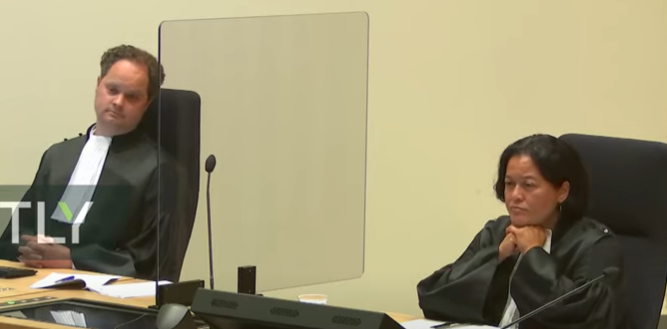
Prosecutors Thijs Berger and Dedy Woei-A-Tsoi listening to the defence presentation. Berger interrupted the proceedings when he didn’t like the video clip played of a Ukrainian witness describing on June 18, 2014, how a Ukrainian Air Force plane “hid behind a passenger plane” before and after a bombing run on the village of Semenovka. “It all went a bit fast,” Berger interjected, “I also have a photo I would like to show you” (June 22, Min 1:28:40).
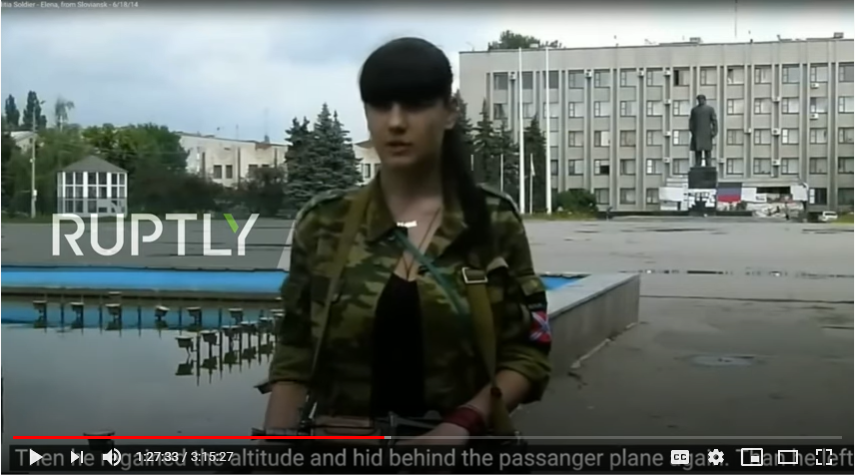
The defence lawyers might have argued that answering these questions to the standard required by Dutch law to prosecute a murder indictment, and convict at the statutory standard beyond reasonable doubt, is impossible for Steenhuis and his associate judges, just as they conceded it is presently impossible for the defence. The terms “legal means of evidence” and “beyond reasonable doubt” weren’t mentioned by either of the defence lawyers, nor any of the other standards of proof required by Dutch Criminal Procedure Code: http://www.ejtn.eu/

Instead, ten Doesschate invited the judge to use his discretion. “At this stage, the investigation, we are saying we need to investigate the reliability of the evidence and all the loose ends remaining to be tied up” (June 23, Min 2:00).
“On the basis of the file we have at this moment it is impossible for us say…partly because of missing radar images; no satellite images from the US; ground soil samples which were taken in a possible launch site but not analysed” (June 23, Min 2:52:30). Ten Doesschate said “we”. But in a Dutch court, the onus of proof is on the prosecution — ten Doesschate should have concluded for Steenhuis that the impossibility of proof is the failure of the prosecution’s.
Not only did ten Doesschate baulk at that, she pleaded with the judge and with her friends who, she said, have been sending her critical emails, for forgiveness. She ended by thanking the judge for listening to her as if that too is a favour unrequired by Dutch law. “If we were not to ask in detail for investigation, we would not be able to look at ourselves in the mirror. This is the least that can be expected of us. Thank you for your attention” (June 23 Min 2:53:19).











Leave a Reply